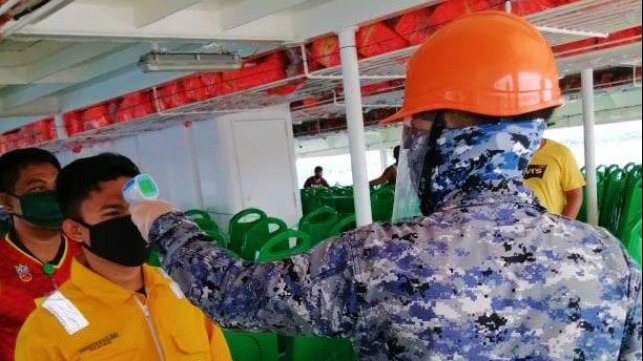Hong Kong Eases Crew Change Rules as Calls Grow Worldwide

Hong Kong became the latest jurisdiction to take steps to facilitate crew changes for the shipping industry as calls for action continue to grow around the world. Recently, ship owners, labor organizations, and other maritime associations have all highlighted the problems of crew changes due to COVID-19 related restrictions.
The Hong Kong Shipowners’ Association (HKSOA) announced that after an ongoing effort the authorities have agreed to revise the rules to permit unrestricted crew transfers. “The Chief Secretary has exercised his powers to approve the exemption of crew members of goods vessels, including those without cargo operations, from compulsory quarantine under Cap. 599E to undergo crew changes in Hong Kong,” said HKOSA.
Earlier in the spring, HKOSA had been successful in gaining initial permission for crew changes but restricted with quarantine requirements and limited to ships in port as part of their normal cargo operations. The new rules still require crew members to limit their contact with the local community, instructing disembarking crew to stay with their vessel until traveling to the airport or their home in China. The incoming crew is instructed to travel directly to their vessel. Hong Kong is also calling for medical monitoring but no longer requiring a quarantine.
Other ports in the region have also established processes for crew changes, but are requiring much more stringent protocols. Singapore, for example, is requiring inbound crew members to remain in quarantine for 14 days and test negative for COVID-19 before their flight to Singapore, while crew signing off need a doctor’s certificate that they are fit to travel prior to departure.
The ongoing crew reparation efforts in Manila have also received extensive attention as an example of local authorities working with crew members. However, each arriving crew member is required to complete a 14-day quarantine and a negative COVID-19 test prior to entering the country.
These steps came as the International Labour Organization (ILO) became the latest organization to call for urgent action to address the problem of seafarers on ships around the world. Last week, representatives of the European Community Shipowners’ Association, the European Transportation Workers’ Federation, Cruise Lines International Association and World Shipping Council, made a similar call to action to EU ministers. Maritime unions in Australia, Ukraine, and the United States have also been calling on local regulators to address the problems created by closes ports and travel restrictions.
Action is required to “release the 150,000 to 200,000 seafarers trapped on board ships around the world because of measures to contain the COVID-19 virus,” according to the ILO. The organization is urging governments, immigration, health, and maritime authorities to work together to recognize seafarers as key workers who ensure the flow of trade and the movement of vital medical supplies, safety equipment, food, and other critical goods during the pandemic.
The ILO believes that limited progress is being made on the plight of seafarers saying the situation is worsening by the day. They point to the fact that many seafarers completed their contracts up to four months ago, only to have their contracts extended when replacement crew members could not be brought aboard. Many crew members “are now reported to be experiencing mental health issues and physical exhaustion, which is reducing their ability to safely carry out their duties,” says the ILO.

that matters most
Get the latest maritime news delivered to your inbox daily.
Urging the recognition of seafarers as key workers ILO Director-General Guy Ryder said, “Forcing exhausted seafarers to continue working more than four months beyond the end of their contract is unacceptable. This jeopardizes their health and endangers maritime safety. Action is needed now to ensure decent work for seafarers, avoid maritime accidents and environmental disasters. We call on governments to work together to make these crew changes happen in safety.”
While many countries have begun to reduce internal restrictions on daily life, the fear of the virus continues to limit international travel. Many ports and international borders remain closed creating the limits on crew changes. While government officials are sensitive to the concerns the level of restriction continues to create significant obstacles for the shipping industry.
